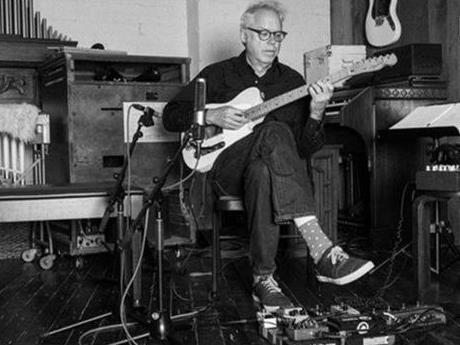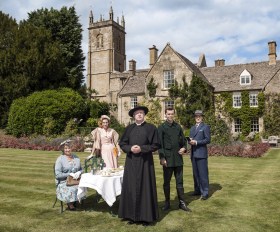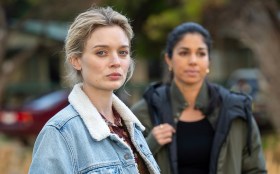Bill Frisell: A Portrait image via ACMI.
The camera follows him interacting with other musicians at rehearsals and alternatively searching to articulate his creative process in close up interview segments. But what warrants such interest?
Bill Frisell: A Portrait by award-winning independent Melbourne film-maker and jazz singer Emma Franz highlights Frisell’s enormous impact on the canvas of American music over the last fifty or so years. It achieves this through an impressive array of interviews with some of his musical collaborators. They range from fellow jazz guitarist Jim Hall and saxophonist Joe Lovano to pop music’s Paul Simon, to Wilco’s rock guitarist Nels Cline, to country and blues singer-songwriter Bonnie Raitt to the BBC’s big band arranger Michael Gibbs.
Even if you think you haven’t heard Frisell’s playing you probably have without realizing it. As the documentary cleverly backgrounds with album covers, he has played on recordings by a diverse range of artists including Bono, Sting, Marianne Faithful, Lucinda Williams, John Zorn to jazz artists like percussions Paul Motian and pianist Jason Moran.
What makes the documentary compelling is Frisell’s frankess and the way he opens himself up in a home setting with the camera full on him to probing about his music. Here is a musician patently not used to articulating his approaches to playing and to composing. But as he strives to express his inner drives the viewer is taken on a journey inside Frisell’s music.
Close to the opening of the film is a quote from Frisell describing a dream he once experienced about music and colours. It sets the tone for the film and is a unifying image that resounds throughout the documentary as Frisell talks about the importance to him of ‘getting the music out’ that is in his head. In hearing one of his compositions performed by an orchestra, he describes it as `bringing to life something that was in my head.’
The documentary pursues a number of theme such as Frisell’s early music career, teachers and influences; his avant garde days in New York with Zorn’s Naked City; his use of drawing as inspiration for music; his many bands; his collection of guitars and selective use of electronic effects; the range of music genres he has been drawn to; his prolific outpouring as a composer and how he writes; and the people supporting him, his painter-wife and his personal sound assistant.
As to be expected with a documentary about a jazz musician, much of the focus is on Frisell playing and improvising. There there are many judiciously selected clips of Frisell in rehearsal or in concert with different jazz bands and in classical and orchestral settings. Here again the camera work is in close and captures the dynamics and interactions of Frisell with the other musicians. Careful attention has been paid to the sound quality of these performances.
The film has a well-paced rhythm to how it moves between talking heads – other musicians fingering what is special about Frisell’s playing such as bending the neck of his guitar-excerpts from concerts, and Frisells’s more intimate moments trying to nail his approach to his music and his boyish enthusiasm over his guitar collection.
Juxtaposed against this is a nostalgic scene in a different mode where Frisell revisits Greenwich Village walking with his back to the camera as just another“music tourist’’. He reminiscences about the house where Dylan once lived and reveals his lasting influence on him. He enthusiastically points out as any jazz buff might that the legendary jazz saxophonist Charlie Parker lived nearby.
This documentary draws a well-rounded and warm portrait of a ponderously talented yet unpretenscious musician who is not afraid to show himself up. During one interview he falters a couple of times when executing a Coltrane tune at a fast speed. `But I will be able to play it tonight,’’ he says laughingly and unfazed, referring to that night’s concert. And he does, effortlessly.
The documentary has its Australian premier at ACMI at Federation Square on Sunday June 4 at 2pm as part of the Melbourne International Jazz Festival. It will be preceded by an introduction by Frisell and film-maker Franz and followed by a Q and A. Tickets available from ACMI
Rating: 5 out of 5 stars
Bill Frisell: A Portrait
Production:
Emma Franz Films
Director:
Emma Franz
Themes:
Arts, Music, Biography
Year:
2017
Country:
Australia
Running Time:
114′
Melbourne International Jazz Festival 2017
2-11 June ACMI
Actors:
Director:
Format:
Country:
Release:





